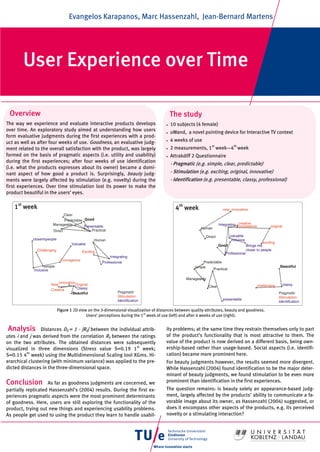Ux poster
- 1. Evangelos Karapanos, Marc Hassenzahl, Jean-Bernard Martens User Experience over Time Overview The study The way we experience and evaluate interactive products develops ŌĆó 10 subjects (4 female) over time. An exploratory study aimed at understanding how users ŌĆó uWand, a novel pointing device for Interactive TV context form evaluative judgments during the first experiences with a prod- uct as well as after four weeks of use. Goodness, an evaluative judg- ŌĆó 4 weeks of use st th ment related to the overall satisfaction with the product, was largely ŌĆó 2 measurements, 1 weekŌĆö4 week formed on the basis of pragmatic aspects (i.e. utility and usability) ŌĆó Attrakdiff 2 Questionnaire during the first experiences; after four weeks of use identification - Pragmatic (e.g. simple, clear, predictable) (i.e. what the products expresses about its owner) became a domi- nant aspect of how good a product is. Surprisingly, beauty judg- - Stimulation (e.g. exciting, original, innovative) ments were largely affected by stimulation (e.g. novelty) during the - Identification (e.g. presentable, classy, professional) first experiences. Over time stimulation lost its power to make the product beautiful in the usersŌĆÖ eyes. st th 1 week 4 week new innovative Clear Predictable Good Manageable creative Integrating courageous Presentable original Human Direct Practical Direct valuable closertopeople Human inclusive Valuable exciting Good Brings me Challenging Exciting closer to people Professional Integrating Courageous Professional Predictable simple simple Beautiful Inclusive Practical Manageable innovative New Original challenging classy Classy Clear Creative Beautiful Pragmatic Pragmatic Stimulation Stimulation Identification presentable Identification Figure 1 2D view on the 3-dimensional visualization of distances between quality attributes, beauty and goodness. st UsersŌĆÖ perceptions during the 1 week of use (left) and after 4 weeks of use (right). Analysis Distances Dij = 1 - |Rij| between the individual attrib- ity problems; at the same time they restrain themselves only to part utes i and j was derived from the correlation Rij between the ratings of the productŌĆÖs functionality that is most attractive to them. The on the two attributes. The obtained distances were subsequently value of the product is now derived on a different basis, being own- st ership-based rather than usage-based. Social aspects (i.e. identifi- visualized in three dimensions (Stress value S=0.19 1 week; th cation) became more prominent here. S=0.15 4 week) using the Multidimensional Scaling tool XGms. Hi- erarchical clustering (with minimum variance) was applied to the pre- For beauty judgments however, the results seemed more divergent. dicted distances in the three-dimensional space. While Hassenzahl (2004) found identification to be the major deter- minant of beauty judgments, we found stimulation to be even more Conclusion As far as goodness judgments are concerned, we prominent than identification in the first experiences. partially replicated HassenzahlŌĆÖs (2004) results. During the first ex- The question remains: is beauty solely an appearance-based judg- periences pragmatic aspects were the most prominent determinants ment, largely affected by the productsŌĆÖ ability to communicate a fa- of goodness. Here, users are still exploring the functionality of the vorable image about its owner, as Hassenzahl (2004) suggested, or product, trying out new things and experiencing usability problems. does it encompass other aspects of the products, e.g. its perceived As people get used to using the product they learn to handle usabil- novelty or a stimulating interaction?

